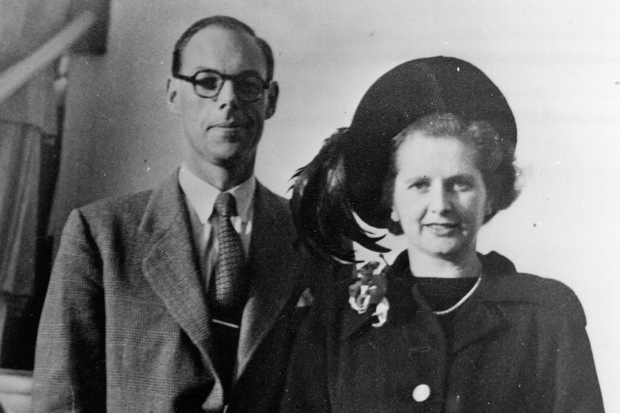As I swink in the field of Thatcher studies, this book brings refreshment. It is a welcome and rare. Far too many writers attitudinise about Margaret Thatcher (for and against) rather than studying her. I doubt the author likes Thatcher much, but all the more credit to her that she makes a fair-minded effort to understand what she believed about God, and how she succeeded and failed in applying her beliefs.
Not all who knew Mrs Thatcher agree that she was religious. In a way, they are right. She was not churchy or denominational, which is good. She was not sacramental (she once told me that her twins were baptised but ‘didn’t have the water’) or spiritual, which is not so good. But Denis thought she had a serious Christian faith, and I think he would know.
Her religion was of a kind which once dominated England. God’s word, expressed in the Bible, set out how to live. People should try to follow this, not only in their private lives, but in the ordering of society. This was a lifelong, exacting duty, requiring ceaseless work to improve oneself and serve one’s country. Material wealth was part of the good harvest which the country needed. Somewhere inside these thoughts was an almost Jewish idea of a chosen people: her talk of Victorian values was partly a romanticised folk memory of a special, British (or rather English) Christian order. Critics might say it was a ‘Sunday best’ religion; but Mrs Thatcher wanted the best seven days a week.
Eliza Filby subtly relates Grantham Methodism to Mrs Thatcher’s 15 years of leadership. So she recognises that her famous ‘There is no such thing as society’ remark to Woman’s Own was almost the exact opposite of atomised individualism. She was talking about how society was composed. ‘There are individual people and there are families,’ not some other thing on which we could dump our responsibilities. Therefore our social duties were absolute.
This was not Tory Anglicanism, though Mrs Thatcher had a tenderness for the Authorised Version of the Bible and in later years was a regular at the chapel of the Royal Hospital, Chelsea. It was, both in the ecclesiastical and in the modern sense of the term, ‘non-conformist’. It produced what Dr Filby well describes as a mastery of the ‘congregational side of politics’: the warm relationship between minister and flock (the party faithful who loved her), the insurgent zeal which made her preach the gospel in and out of season.
This made it more powerful as what the author calls a ‘values project’ than that of the leadership of the Church of England, most of which was ranged against her. Although Filby is sympathetic to the benevolent motives of most of the Anglican bishops, she does show the astonishing extent to which they saw the 1945 settlement as a more sacred thing than religion itself. David Sheppard, the left-wing Bishop of Liverpool, actually denounced charity, because it is ‘discriminate and dictated by preferences or prejudices’: state compulsion was much better. The bishops could never quite make up their mind about poverty. They said it was dreadful when Thatcher ‘condemned’ people to it, but then got even angrier when, under her, most of them got much richer.
They were also quite rude about her, whereas she offered a courtesy to them which she rarely showed to, say, trade union leaders. They did not respect the sheer effort she put into debating religion and public policy. After her famous speech to the General Assembly of the Church of Scotland in 1988 (‘The Sermon on the Mound’), the Episcopalian Bishop of St Andrews sniffed at her ‘laywoman’s use of the Bible with a vengeance’.
This book covers almost the whole sweep of subjects where God and Mrs Thatcher had something to do with one another: Sunday trading, Section 28, the Bomb, debt, riots, unemployment, Aids, apartheid, appointing bishops and The Satanic Verses. The only important political/religious point it rather misses is that Mrs Thatcher was strongly morally driven to fight the selfishness of trade union power as well as the economic damage it did. Filby repeats the error that she called the miners ‘the enemy within’. No, that was what she called the miners’ leaders, the men who wouldn’t let their members have a ballot.
Filby’s conclusion is unfavourable to Mrs Thatcher, not so much to her motives as to her success. She thinks that, without wanting to, she presided over the end of Britain as a Christian country. I haven’t yet got far enough in my fieldwork to know whether she is right, but I would strongly recommend this book to anyone who is interested. ‘Dare to be a Daniel,’ Margaret’s father always told her, and she did. Although it must be admitted that the lions she confronted in the episcopal den were pretty toothless, it is a surprisingly exciting story.
There is one puzzle about this book. Although it is generally well written, the author uses words that are either misapplied or do not quite exist. I noticed ‘renouncement’, ‘honed in’, ‘securement’, ‘conscious-raising’, ‘metal’ when she means ‘mettle’ and ‘Lord Chancellor’ when she means ‘Lord Chamberlain’. Oh for an editor.







Comments